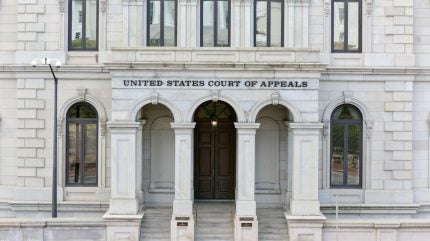
The court also refuted Trump’s defence that an emergency economic powers act justified the tariffs, labelling them “invalid as contrary to law”.
This decision challenges tariffs that were applied globally under the guise of “reciprocal” measures, as well as specific tariffs on goods from China, Mexico, and Canada.

Discover B2B Marketing That Performs
Combine business intelligence and editorial excellence to reach engaged professionals across 36 leading media platforms.
The court permitted the continuation of the tariffs until 14 October, providing the Trump administration with an opportunity to appeal the decision to the US Supreme Court, according to media reports.
The case addresses the scope of presidential authority under the International Emergency Economic Powers Act (IEEPA) to regulate imports in response to a national emergency declared by the US President.
The judges say Trump declared multiple national emergencies since taking office.
Following these declarations, he deviated from established tariff schedules and implemented tariffs of indefinite duration on imports of nearly all goods from almost every nation that trades with the US, they noted.

US Tariffs are shifting - will you react or anticipate?
Don’t let policy changes catch you off guard. Stay proactive with real-time data and expert analysis.
By GlobalDataThe court said “IEEPA’s grant of presidential authority to “regulate” imports does not authorise the tariffs imposed by the Executive Orders, we affirm”.
In response, Trump criticised the court’s decision on Truth Social, asserting that removing these tariffs would severely weaken the US financially.
“Today a Highly Partisan Appeals Court incorrectly said that our Tariffs should be removed, but they know the United States of America will win in the end. If these Tariffs ever went away, it would be a total disaster for the Country. It would make us financially weak, and we have to be strong,” Trump wrote.
In their detailed 127-page judgment, the appellate court judges opined that Congress likely did not intend to deviate from its historical protocol and bestow upon the president unrestricted power to enact tariffs when it enacted the legislation in 1977.
“The statute bestows significant authority on the President to undertake a number of actions in response to a declared national emergency, but none of these actions explicitly include the power to impose tariffs, duties, or the like, or the power to tax,” the court stated.
The ruling was prompted by lawsuits from small businesses and a group of US states following Trump’s executive orders in April, which set a baseline 10% tariff on imports from almost every country and additional “reciprocal” tariffs aimed at rectifying trade imbalances.
Previously in May, a New York-based Court of International Trade had deemed these tariffs illegal, but that decision was “put on hold” during the appeals process.
The White House legal team had argued before the ruling that revoking these tariff powers could lead to catastrophic economic outcomes akin to those seen in 1929, according to the BBC.
They contended that such action would compromise national security, foreign policy, and economic stability.
This pivotal ruling also casts doubt on agreements made with certain nations for reduced tariff rates.





